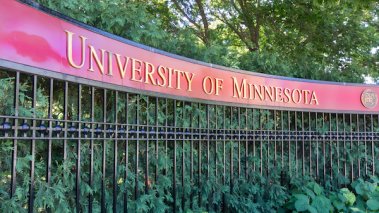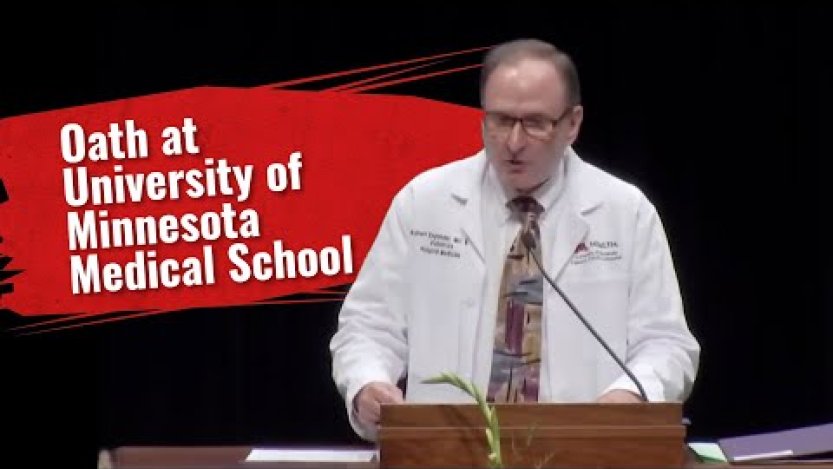Table of Contents
University of Minnesota Medical School’s updated Hippocratic Oath could raise compelled speech concerns

Ken Wolter / Shutterstock.com
University of Minnesota Medical School students read an updated Hippocratic Oath, penned by a small group of classmates, that appears to commit the entire class to a variety of contested political viewpoints.
- Medical schools nationwide are adopting student-written oaths at white coat ceremonies.
- Many contain highly-politicized statements not all students may agree with.
- Are you a med student who’s been forced to read one of these pledges? We want to hear from you.
Every year, incoming students at many medical schools across the country earn their white coats and pledge to “First, do no harm,” in what are known as “white coat ceremonies.” But this year, the University of Minnesota Medical School appears to ask its incoming class to pledge allegiance to a controversial set of ideologies crafted by a small subset of students — ideas with which other students may disagree. If mandatory, this practice would violate dissenting students’ First Amendment rights.

Public universities like UMMS are constitutionally bound to protect expressive rights. At the same time, they can strive to better serve students from historically marginalized populations. Universities can even encourage students to adopt practices furthering these goals. But they cannot force students to attest to personal beliefs they may not hold.
That’s what may be happening at UMMS, where administrators said a handful of the hundreds of incoming students prepared this year’s updated Hippocratic Oath for the entire class to read. Student-updated ethics oaths are trending at medical schools nationwide; they go beyond the traditional promises like “do no harm.” Similar student-authored oaths were adopted in recent years at medical schools like Harvard, Columbia, WashU, Pitt Med, and the Icahn School of Medicine.
FIRE wrote today to UMMS to get clarification about what appears to have happened at its most recent white coat ceremony.
Medical students possibly being made to read verbatim from ideological pledges if they wish to become physicians would be a new low.
The video shows students being led by a dean who directs them to stand and recite each word in unison — suggesting recitation of the oath may indeed be mandatory. The students acknowledge they are on indigenous land, vow to fight “white supremacy” and foster a culture of “anti-racism,” and promise to “honor all Indigenous ways of healing that have been historically marginalized by Western medicine.”
FIRE respects students’ rights to express their views. But because only a small committee of all new students penned the statement, some of the other several-hundred students may have been compelled to express that handful of classmates’ opinions as their own. (It’s unclear whether any students dissented and, if so, whether they could opt out.)
We’re also concerned that these subjectively squishy commitments could become de facto professionalism requirements, and that students could be punished for failing to uphold them. For example, what must a medical student do to adequately practice “anti-racism”? And whatever that may be, if she does not (as UMMS understands that term), could she be dismissed for violating her oath? What if she refuses to take the oath in the first place?
FIRE has certainly seen administrators of professional programs in medicine, dentistry, law — even mortuary science — who deployed ambiguous “professionalism” standards to punish students for otherwise protected speech.
Video of the Minnesota ceremony comes at a time when similar DEI initiatives are spreading nationwide. FIRE has seen a huge uptick in colleges and universities forcing students, and especially faculty, to pledge fealty to administrators’ subjective conceptions of “Diversity, Equity and Inclusion,” or “DEI.”
More than 10% of the campus-related cases in which FIRE intervenes now concern requirements that students and faculty demonstrate their DEI commitments or contributions, or personally make land acknowledgements.
The University of Minnesota Medical School must “First, do no harm,” by respecting incoming students’ basic constitutional rights.
Again, while universities, students, and faculty are free to encourage or promote DEI-type values, forcing others to say they believe in these concepts is not only contrary to many universities’ legal obligations — but violates their moral obligations, too.
Consider: Even students or faculty who broadly agree with a university’s stance on DEI may believe, for example, that land acknowledgements are merely performative. Or a faculty member who studies race and gender may have highly nuanced views on DEI not reflected by the university’s stance. Students, likewise, may disagree with other aspects of a given DEI pledge.
Medical students possibly being made to read verbatim from ideological pledges if they wish to become physicians would be a new low.
The University of Minnesota Medical School must “First, do no harm,” by respecting incoming students’ basic constitutional rights. To do so, the administration must make clear to its incoming class that UMMS will not force them to express views they may not hold.
FIRE defends students and faculty — regardless of their views. Are you a medical student required to recite an oath or pledge you don’t agree with? We’d like to hear from you. Go to thefire.org/alarm to tell us more.
Recent Articles
FIRE’s award-winning Newsdesk covers the free speech news you need to stay informed.

A third of Stanford students say using violence to silence speech can be acceptable

Stanford president and provost cheer free expression in open letter to incoming class

FIRE survey shows Judge Duncan shoutdown had ‘chilling effect’ on Stanford students


